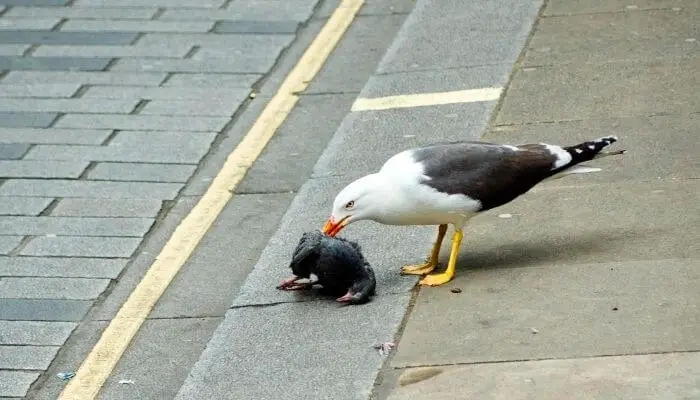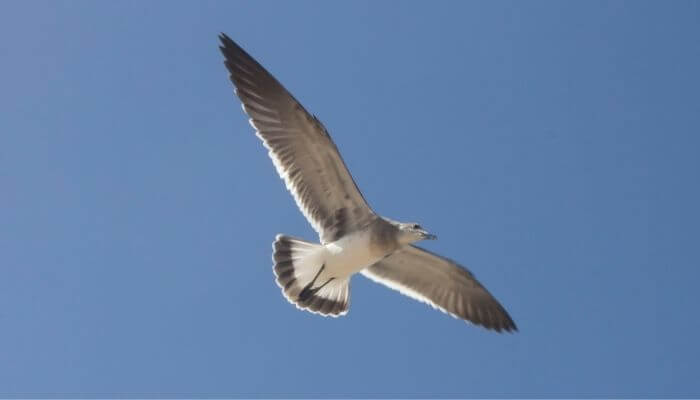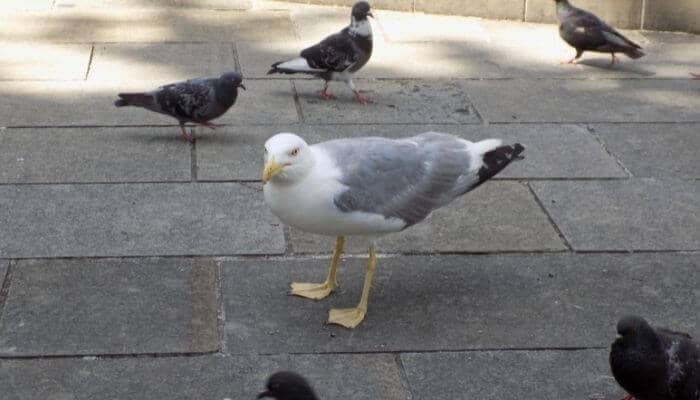It’s not a pleasant image, but seagulls have been known to hunt, kill and eat pigeons.
A pigeon might not be the number one choice for a seagull, but if it is hungry enough then a seagull will take advantage of its higher predator status and do what has to be done!
It isn’t like we are watching pigeons being plucked out of the skies by hungry seagulls every single day but the answer to this seemingly simple question is more complicated than you might think!
Here is a guide to what seagulls are and what they like to eat (including the odd pigeon now and again!).
Why Do Seagulls Eat Pigeons?
The main reason for a seagull to eat a pigeon is the simple fact that there is no other source of food available.
A seagull won’t allow itself to starve when there are options, and if the pigeon happens to be that option, then nature will definitely take its course.
Seagulls will also have a natural predatory instinct over a pigeon, being higher up in the pecking order, so to speak!
That predatory nature will kick into action if they are looking for a meal and come across a pigeon that appears particularly weak or vulnerable.

Seagulls will also eat pigeons’ eggs, but they will no more target them than the eggs of any smaller bird.
Despite it being thought of as a last resort meal, there have been increasing reports of seagulls attacking and eating pigeons.
Some report it as being due to scarcity of food during lockdowns while others blame it on climate change interfering with the natural order of things.
What Else Do Seagulls Eat?
Pigeons have developed the reputation of being the garbage bins of the avian world but if they have a rival, it is the seagull.
While similar in having a liking for any discarded human food, gulls are more audacious and will happily steal food right from a human’s hand given the opportunity.
Who hasn’t seen clips of gulls pinching chips at the seaside? They will even turn robber and pinch crisps from a shop.
Incredibly, research has shown that seagulls prefer food that has been handled by humans!
When man-made nourishment isn’t readily available and there is insufficient instinct to make a bird kill, gulls will eat a whole range of things including:
- Fruit
- Earthworms
- Seeds
- Fish
- Small invertebrates
- Household waste
- Human food scraps
- General waste and food that they find when browsing landfill sites
How Do Seagulls Hunt Pigeons?
Gulls are not aerial hunters like other birds that prey on pigeons.
Gulls will mainly pick on smaller and weaker pigeons on the ground, pecking them and beating them with their wings and feet.
Gulls have much stronger beaks and their webbed feet with claws are an effective weapon. Gulls have also been known to drown a pigeon by holding it down underwater.
How Do Pigeons Protect Themselves Against Seagulls?
Unfortunately, there isn’t too much that a pigeon can do in order to protect itself from a seagull.
When it comes to pigeons vs seagulls, unfortunately, nature has ill-equipped the pigeon to deal with bigger birds that may attack them such as gulls, raptors, and magpies.
A pigeon’s beak is not designed for fighting or killing, but rather for foraging and eating things like seeds and grains.
Additionally, their humble claws are nowhere near the strength or sharpness that would be needed to fend off the attacking power of a larger gull.
The one advantage that certain types of speed pigeons might have is their ability to tumble and weave in the air, so if a pursuit were to take place in the open air, a pigeon might have a small chance of being able to bob and weave away from the attacker.
What Is a Seagull?
There is no such bird species as a seagull.
The word seagull is commonly an informal way of referring to birds of a particular appearance that frequent the seaside.
The word has become so ingrained in the vernacular that even the inland birds of the type (such as those that love landfill sites) are still referred to as seagulls.

The birds that to the general public are seagulls belong to the Laridae family which includes gulls terns and skimmers amongst its 100+ species.
What the British and Americans typically call seagulls are herring gulls, namely, the European herring gull and the American herring gull.
Others with the misnomer might be black-headed gulls, little gulls, Pacific gulls and ring-billed gulls among others.
How To Keep Seagulls Away from Your Pigeons
Gulls do stray from the seaside – particularly in the winter, so if you keep pigeons at home you need to protect them from possible attacks.

When you build a pigeon coop keep the entrances small enough for your pigeons but not big enough for gulls.
Other methods include:
- Decoys
Seagulls and all other kinds of birds are always going to be put off by the presence of a larger bird higher up the food chain or at least something that looks like one!
Use decoys around your pigeon’s places – either the coop or perches in your garden.
Move them around occasionally because invaders will soon recognize a bird that never moves.
- Cover Your Rubbish
Seagulls might first and foremost be attracted to any food waste that is lying around in your environment, so to make sure that they don’t venture down and then notice any pigeons nearby, make the effort to keep all of your bins and other waste covered.
The fewer temptations that seagulls have to come and explore, the less likely they will be to both notice and be tempted by your pigeons!
The pigeon doesn’t have the best reputation but on the evidence presented above, maybe it is the seagull that deserves our dislike instead.
